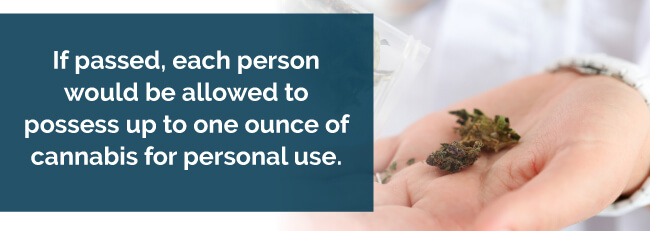
The Kentucky state legislature is considering a medical marijuana program that could start in 2018. Legislators in favor of the measure cite other states’ progress on medical marijuana as evidence that it could be a good move. With 29 other states already authorizing marijuana for medical use, some legislators in Kentucky want to join the movement, so their state isn’t the last to legalize medical marijuana.
The people of Kentucky seem to favor the legal use of marijuana. In 2012, 80% of voters polled were in favor of a medical marijuana program. But, opposition to the proposed bill expresses concern about federal law. Since marijuana is still classified by the FDA as a Schedule I substance, there’s some hesitancy to pass state legislation in opposition to this federal law. However, Kentucky lawmakers did pass a “right to try” bill, which allows doctors to prescribe medicine to end the lives of patients who no longer wish to live — the FDA doesn’t approve of that, either. Some legislators point out that medical marijuana would be no different.
Kentucky’s criminal ban on marijuana recently received a legal challenge during a lawsuit that claimed the ban on medical marijuana violates state privacy protections. In the trial, a medical marijuana patient from another state claimed Kentucky denies her access to medicine that works because she moved back to the state to live with her ailing mother. The lawsuit also touches on the opioid addiction crisis and the idea that medical marijuana keeps patients off of dangerous drugs. Medical marijuana advocates will be watching this case closely.
If passed in its current version, the proposed medical marijuana bill would limit access to medical marijuana to adults over the age of 21. Each person would be allowed to possess up to one ounce of cannabis for personal use. Patients would also be able to grow up to five plants for personal use, but the permission of the owner would be required to consume cannabis on private property.

The legal possession of marijuana would be based on a doctor’s recommendation. No one under the age of 18 could legally possess marijuana. The state would put strict prohibitions on people under 18 encountering marijuana, entering a dispensary or being around someone who’s consuming marijuana.
Licenses for marijuana usage, cultivation and sales would be administered through the Department of Alcoholic Beverage and Cannabis Control. The department will establish security requirements for cannabis cultivation and distribution facilities, including the transportation and storage of marijuana products. They’d also detail procedures for packaging and labeling marijuana products for sale.
The department would create separate licenses for cultivation, processing, testing and retailing cannabis. Any business entity could only obtain one license for marijuana and participate in one phase of the industry. Marijuana licenses would be good for one year and cost $5000 to establish and renew. The money collected in license fees would be used to administer the medical marijuana program.
The proposed medical marijuana bill establishes an excise tax on all sales or transfers of cannabis products. Cannabis flower would be taxed at $30 per ounce. The tax on other parts of the cannabis plant would be $10 per ounce. Immature cannabis plants would be taxed at $10 per ounce.
Taxes collected from marijuana sales would be deposited into the Kentucky Responsible Cannabis Use Program fund. The money in this fund would be distributed according to this schedule:
The proposed medical marijuana bill makes a clear distinction between marijuana for medical use and possession of marijuana for any other purpose. It says that anyone in possession of marijuana who’s not a qualified patient or following the restrictions set out by the program is in violation of the law. Marijuana will be confiscated and destroyed if it is found on any person who is not a qualified medical marijuana patient.
The state also stipulates in this proposed bill that it will have supreme authority over medical marijuana legislation. No municipality or other entity may attempt to ban medical marijuana through local law or regulations. It primarily prohibits municipalities from creating zoning ordinances that would preclude cannabis operations from locating in their jurisdiction.
If the Kentucky legislature passes this medical marijuana bill, there will be positive ramifications for physicians and patients. Doctors will be able to recommend the medicine that can help their patients instead of being forced to use less efficient, addictive and dangerous alternatives. Doctors will be able to apply what they know about the healing properties of cannabis to patients who can benefit from them.
People who are suffering from debilitating conditions will have an improved quality of life. Instead of opioids being the only option for treating chronic severe pain conditions, patients will have an alternative therapy that works and does not create dependence and other unsafe side effects.
With access to medical cannabis products, patients in Kentucky will face end-of-life care with comfort and dignity. Those fighting terminal diseases with chemotherapy will be able to pursue their treatments longer because cannabis reduces nausea associated with chemo and restores appetite to bolster strength.
Patients in Kentucky living with chronic seizure disorders will have a chance to pursue daily activities without the fear and danger of seizures. Cannabis reduces the severity and frequency of seizures, making it easier for patients to perform regular daily functions, leave their homes and engage in society.
Many positive results can come from Kentucky establishing a medical marijuana program. Passing the proposed bill would be a step forward for the state’s residents, as it would give them access to medicine that residents of many other states already have.
To find out if medical marijuana is the right treatment for you, use our doctor search feature to find a marijuana doctor in your state.
No Information on MarijuanaDoctors.Com should be used to diagnose, treat, prevent or cure any disease or condition. You can view our Full Disclaimer here.